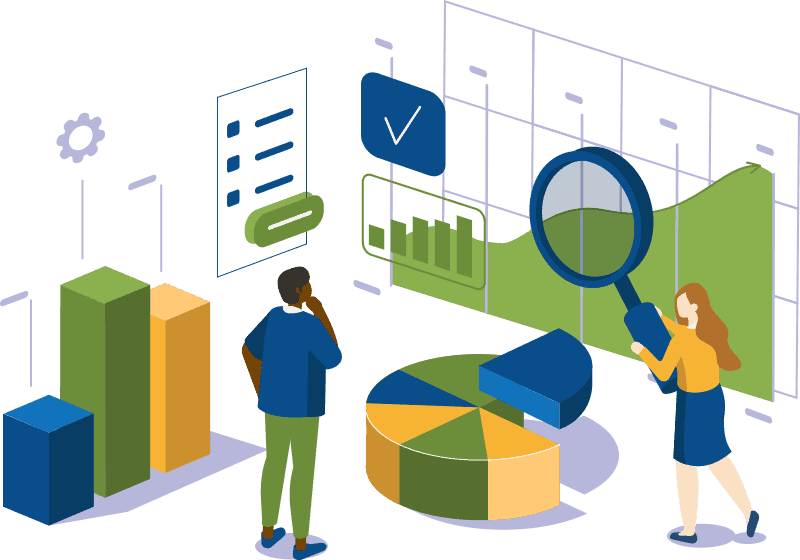Enterprise Data Governance Strategy & Solutions
Employing Proper Data Governance Ensures Data Consistency, Integrity, and Transparency.
Data Governance is a system of rights and accountability processes that allow for effective and efficient data-related decisions to be made within your organization.
Implementing data governance in a controlled and well thought-out manner allows for an effective solution to be adopted by your enterprise and enhances the overall approach.
Datavail’s expert team takes a holistic approach to data governance to align all facets of your organization. This lets you ensure data assets are of the highest quality and integrity while remaining compliant and adhering to best practices.
What is the Definition of Data Governance?
The program will work closely with data analysts and data stewards in reviewing of policies, procedures, data quality standards, naming conventions, data security levels, resolving data conflicts across business domains, change management processes, prioritizing reporting needs, and will function jointly across the organization’s area domain executives.
Datavail’s Data Governance Services and Solutions Include:
- Assist in the planning and development of goals for your enterprise, then for each individual department of your organization.
- Develop a standard of data governance best practices and guiding principles tailored to your organization’s needs.
- Streamline data sharing and improve data analytics and reporting systems through a single management record (Master Data Management).
- Perform data profiling on data sets to ensure the consistency and quality of all data.
- Analyze results to help inform the development of data governance rules and processes.
- Provide accurate and timely reporting solutions designed to help leverage data across the enterprise.
- Identify and document the critical Key Performance Indicators (KPIs) that are critical to your operations
- Assist in the discovery and remediation of data-related issues.
- Develop a maturity model for how the data governance program is progressing.
Data Governance Tools Benefits Include:
Reliability
Consistency and Integrity
Completeness
Control
Contact Us
* denotes a required field:

Why Data Governance? Datavail’s Approach and Best Practices
Data Governance:
- Should be a prerequisite for any type of data projects that an organization is undertaking.
- Helps make sure that information used will be communicated, handled, measured and interpreted consistently throughout your organization.
- Defines consistent, uniform data and processes across the organization for better and more comprehensive decision support.
- Increases the scalability of the IT landscape at a technical, business and organizational level through clear rules for changing processes and data, and implementing new systems.
- Allows for a higher confidence in data through quality-assured and certified data as well as complete documentation of data processes and rules (e.g. building a centralized data glossary).
- Provides security for internal and external data through monitoring and reviewing privacy policies.
- Allows for increased process efficiency by reducing long coordination processes to implement new systems (e.g. through clear requirements management).
- Links business strategy to high-level business goals, by defining core business KPIs to critical data.
- Establishes clear governance roles and accountability across the organization.
- Improves an organization’s decision making through controlled access and visibility to a single version of data truth, making it easy to quickly assess information and decide how to act on it.
- Assists with regulatory compliance so that an organization can better respond to audits and demonstrate compliance with data regulations through proper reporting and documentation, including end-to-end lineage.
- Manages and establishes guidelines for “retention” of data (online vs archive).
- Establishes procedures and guides for managing “third party data” outside vendors (standards by which data will be received and pushed).
- Helps with revenue growth by uncovering ways to reduce expenses, create new revenue streams and even monetize your data.
- Takes into account application and API governance so that standardized governed templates can be shared with software vendors as needed. This helps to maintain a consistent journey of data through the software lifecycle.
Purpose of an Organizational Data Governance Program
- Data governance policies must be institutionalized within the organization to provide structure and guidelines.
- A data governance team needs to be established at the time when policies and standards are being proposed and drafted.
- There should be an overarching policy that defines the organizational mandates for the data governance program.
- Determines how the organization will deliver upon the data guiding principles in practical defined terms.
- Establish roles within the organization which will be held accountable for the execution of these policies.
- Provides the framework for the creation of standards and processes, ensuring clear traceability and consistency.

Why Companies Fail to Implement a Data Governance Strategy

Data Governance Value Proposition
- Provides clear and consistent guidelines.
- Drives accountability across all levels of the organization, holding stakeholders accountable, and establishes a data stewardship program.
- Sets the foundation for how the parameters of the data governance program will be enforced.
- Directs adherence to compliance, quality and regulations including SOX and other requirements.
Fill out the form on this page to schedule a chat with our team of data governance experts about your needs and objectives.
Further Reading
Data Governance: A Valuable Part of Business Information Success
Data Governance Service Overview
Business Intelligence or Business Inconvenience?
Work with Us
Let’s have a conversation about what you need to succeed and how we can help get you there.
CONTACT USWork for Us
Where do you want to take your career? Explore exciting opportunities to join our team.
EXPLORE JOBS